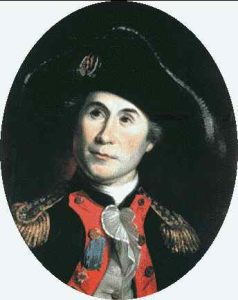In January, 1775, William Franklin, the governor of the colony of New Jersey, addressed the legislature, warning them not to sanction certain proceedings connected with the dispute existing between the mother country and the colonies, assuring them that all their grievances would be redressed on petition. Lieutenant-governor Colden, of New York, followed in the same path, and had great success with the New York Assembly; the majority of that body agreeing not to send delegates to the Congress that was to assemble in May of that year. This success was a triumph for the loyalists, and was the cause of great rejoicing. The following song of exultation appeared a short time after the event, in the Gazetteer, at New York, and has been attributed to Rivington, the editor of that paper; but without arty authority.
Loyal York
AND so, my good master, I find ’tis no joke,
For York has stepp’d forward, and thrown off the yoke
Of Congress, committees, and even King Sears,1
Who shows you good nature, by showing his ears.
I trembled lest York should have join’d the mad freak, And formèd a part of the damnable sneak;
The fever abated, see order arise,
With ag’d constitutional tears in her eyes.
Having summon’d her sons, who too wantonly stray’d,
And calling her fair sister Grace to her aid,
The youth she address’d, in such accents of love,
As coming from mothers, ought always to move.
Says she, “My dear children, ah! why should ye roam,
In quest of rude discord, and leave me at home?
Your godfather Monarchy, bleeds at the heart,
To think that his sons should from virtue depart.
“Consider how long we have cherish’d, protected,
How much we’ve indulg’d, and how little corrected,
How oft we’re provok’d, and our councils tormented;
What insults forgiven, what bloodshed prevented,
“Behold your good brother, who rules in the north, Examine his conduct and copy his worth:
Observe how Apollo presides, and you’ll find,
How lovely are mercy and power combin’d.
“His task, though severe, he discharges with ease,
And studies, like us, to preserve and to please;
Oh ! think how he feels, between brother and brother, When he’s sent to reconcile one to the other.
“Then cease, I beseech you, nor longer provoke
The hand, which so tenderly wards off the stroke.
Such counsel as this was enough, one would think,
To save them from ruin, though just on the brink.
“But would you believe, a committee they’d choose, Consisting of three, who had nothing to lose ?
One was a cock of the first game,
Who hand over hand was determin’d on fame.
“The second A-dam dog who lives upon strife,
And knows nought but hemp can lead him a worse life:
The third was a Cooper,2 good Lord, long preserve him,
Or, as I want rhyme, may his customers starve him !
“Together they went on a grand consultation,
To prove a republic was good for the nation,
And to show the old dame, it was easily prov’d, Pronounced, by four words, all objections remov’d.
“Inestimable rights, infernal chains”,
A sleeping potion for a Briton’s brains.
The aged matron silently withdrew,
Wept for her sons, and left them, Gage! to you.
- “King Sears.” “Isaac Sears was born at Norwalk, Connecticut, in 1729. He was a successful merchant in the city of New York, when political matters attracted his attention. When the Stamp Act aroused the colonists, Sears stood forth as the champion of right, and was one of the most active and zealous Members of the association of the Sons of Liberty.” He was celebrated during the war for his self-denial, and devotion to the cause of liberty. He died at Canton, where he had gone with a cargo, in 1785. Lossing’s Field Book.
- “The third was a Cooper.” Dr. Cooper, town clerk of Boston, called by Rivington, “the fragrant Rose of Sharon.”

